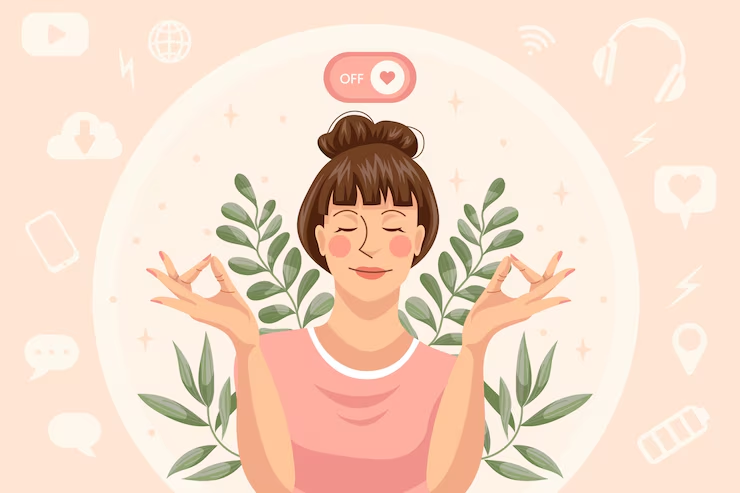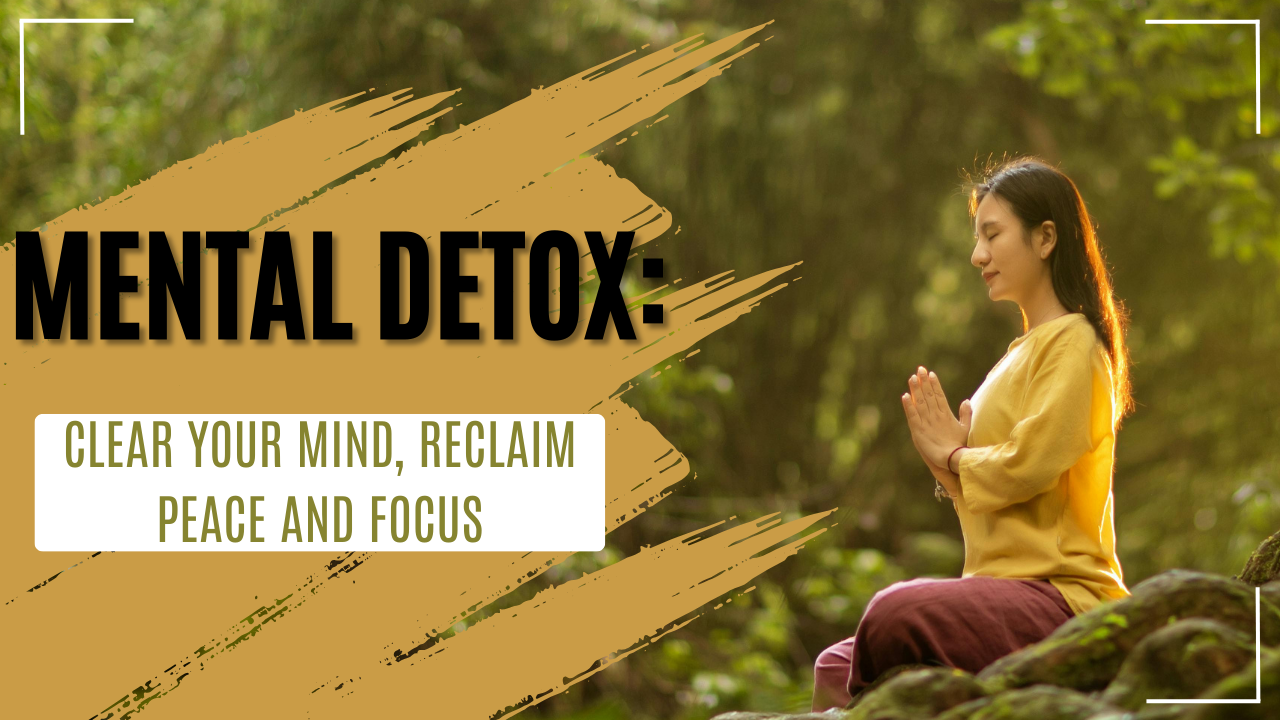In today’s fast-moving world, we are constantly surrounded by information, digital screens, and emotional stress. With the nonstop stream of news, messages, and demands, it’s easy for our minds to feel overwhelmed and cluttered. Just like our bodies can feel tired from unhealthy habits, our minds also need attention and care to stay balanced and clear.
This is where the idea of a mental detox becomes important. It means taking a break from all the noise—both digital and emotional—and allowing your mind to rest and reset. A mental detox helps you clear negative thoughts, reduce stress, and regain focus. It can involve simple steps like unplugging from devices, practicing mindfulness, or spending time in nature.
By making mental detox a regular part of your routine, you can improve your mental clarity, emotional balance, and overall well-being. In our fast-paced lives, giving your mind a break is no longer a luxury—it’s a necessity.
This article will explore what mental detox is, why it’s necessary, how it benefits your overall well-being, and actionable steps to integrate it into your daily life.
What Is Mental Detox ?

Mental detox is the process of clearing out negative thoughts, emotional stress, and mental clutter that build up over time. Our minds are constantly working, taking in information and reacting to challenges, which can lead to overload. A mental detox helps to create a fresh start by allowing the mind to slow down and let go of what no longer serves us.
This process involves intentionally stepping back from daily stress, disconnecting from digital devices, and avoiding negative influences. By doing so, you begin to remove toxic thoughts and habits that affect your emotional well-being. A mental detox gives your mind a chance to rest, breathe, and reset.
Just like a physical detox removes harmful substances from the body, a mental detox removes stress and tension from the mind. It helps improve focus, mood, and clarity. Regular mental detoxing supports better decision-making and a stronger sense of peace and control in your life.
Why Mental Detox Is Necessary
Information Overload
Every day, we are surrounded by a nonstop stream of information from news websites, social media platforms, emails, texts, and more. On average, a person consumes about 74 GB of data daily. This constant exposure overwhelms the brain, causing mental exhaustion. It becomes difficult to focus, remember important things, or make wise decisions. A regular mental detox can help clear the mental clutter and restore your ability to think clearly.
Emotional Residue
Each interaction we have, whether positive or negative, leaves an emotional impact. Over time, unresolved issues, past traumas, and everyday stress can pile up, quietly influencing your mood, reactions, and mental well-being. These emotional layers make it harder to feel balanced. A mental detox allows you to release this emotional weight and find inner peace.
Burnout and Stress
When the mind is constantly under pressure without rest, burnout becomes likely. This may show up as irritability, lack of interest in daily activities, trouble sleeping, or even physical symptoms. Taking time for a mental detox gives your brain the rest it needs to recharge and heal.
Loss of Self-Awareness
A cluttered mind makes it easy to lose touch with yourself. You may start functioning on autopilot, unaware of your personal needs, goals, or feelings. This disconnection can lead to a lack of direction or purpose. Practicing mental detox helps you reconnect with your true self and live more intentionally.
The Benefits of Mental Detox
A mental detox is more than just a feel-good practice—it offers real benefits for your overall well-being. By clearing out mental clutter and emotional stress, it helps improve focus, boost mood, and reduce anxiety. Regular mental detoxing can also lead to better sleep, increased energy, and a stronger sense of inner peace. It doesn’t just affect your mind; the positive effects often extend to your physical health as well. Taking time to reset your mind can make a big difference in how you feel and function each day.

✓ Enhanced Mental Clarity
When you clear away mental clutter, your thoughts become sharper and more focused. A mental detox helps remove distractions, making it easier to concentrate, understand information clearly, and make thoughtful decisions with greater confidence and calmness.
✓ Improved Emotional Balance
A less cluttered mind allows you to manage your emotions more effectively. You become less reactive to daily stress, more aware of your feelings, and better at handling emotional challenges with patience and mindfulness.
✓ Increased Productivity
With fewer mental distractions, you can focus your energy on what truly matters. A mental detox helps improve your efficiency, allowing you to be more creative, organized, and productive in your work or personal life.
✓ Better Relationships
Releasing emotional baggage helps you connect more deeply with others. You become more present, understanding, and empathetic, which improves communication and strengthens relationships.
✓ Restored Sleep and Physical Health
By easing stress and reducing overthinking, a mental detox supports deeper, more restful sleep. It can also lessen the impact of stress-related physical issues like headaches, fatigue, or tension.
Signs You Need a Mental Detox
You feel constantly overwhelmed or anxious.
You’re mentally exhausted even after a full night’s sleep.
You struggle with concentration or memory.
You have negative self-talk or obsessive thinking.
You feel emotionally numb or easily triggered.
You can’t disconnect from your phone or social media.
If any of these resonate with you, it may be time for a mental reset.
How to Do a Mental Detox: 10 Powerful Strategies
Digital Fasting
Digital fasting means taking a break from electronic devices like phones, computers, and social media. In today’s world, constant screen time can overload the brain with too much information. This can lead to stress, anxiety, and mental fatigue. By stepping away from digital distractions, even for a short time each day, you give your mind a chance to rest and reset.

As part of a mental detox, digital fasting helps improve focus, reduce anxiety, and boost emotional balance. It allows you to reconnect with the present moment and spend more time doing meaningful activities. Over time, this practice can lead to better sleep, clearer thinking, and a stronger connection with yourself and others.
Benefits:
Improves Focus and Clarity
Taking breaks from screens helps reduce mental clutter, allowing your brain to focus better and think more clearly.
Reduces Stress and Anxiety
Stepping away from constant notifications and online content lowers stress levels and helps calm the mind.
Boosts Emotional Well-being
Digital fasting gives you more time to reflect, relax, and connect with real-life experiences, improving mood and emotional balance.
Mindfulness Meditation
Mindfulness meditation is the practice of paying full attention to the present moment without judgment. It involves focusing on your breath, thoughts, and feelings in a calm and accepting way. This simple practice helps slow down racing thoughts and brings awareness to your inner self. Over time, it becomes easier to stay calm and focused, even during stressful situations.
As a key part of a mental detox, mindfulness meditation helps clear emotional clutter and mental stress. It improves your ability to concentrate, manage emotions, and feel more balanced. Regular practice can lead to better sleep, reduced anxiety, and a greater sense of peace. It also helps you reconnect with yourself and find clarity in your daily life.
Benefits:
Reduces Stress and Anxiety: Mindfulness meditation calms the mind, helping you release stress and emotional tension during a mental detox.
Improves Focus and Clarity: By training your attention on the present moment, it enhances mental clarity and supports a more effective mental detox.
Boosts Emotional Balance: Regular practice helps regulate emotions, making you feel more peaceful, centered, and emotionally stable through your mental detox journey.
Journaling
Journaling is the habit of writing down your thoughts, feelings, and daily experiences. It offers a safe space to express what’s on your mind, helping you release stress and understand your emotions better. Writing regularly can bring clarity to your thoughts and allow you to recognize patterns in your behavior or thinking.

As part of a mental detox, journaling helps clear mental clutter and emotional buildup. It encourages self-reflection, emotional healing, and better decision-making. This simple practice can reduce anxiety, boost your mood, and improve your overall mental well-being. Over time, journaling helps you feel more organized, calm, and in control of your inner world.
Here are its 3 key benefits:
Clears emotional and mental clutter
Reduces stress and anxiety
Supports self-awareness and personal growth
Declutter Your Environment
Decluttering your environment involves organizing and removing unnecessary items from your home or workspace. A tidy, well-organized space can have a powerful impact on your mental state. When your surroundings are cluttered, it can create a feeling of chaos and contribute to stress and anxiety. By simplifying your environment, you create a peaceful, calming atmosphere that supports mental well-being.
As part of a mental detox, decluttering helps clear both your physical and mental space. A clean, organized space promotes focus, reduces distractions, and makes it easier to relax. It also encourages a sense of control and accomplishment, which can improve mood and reduce feelings of overwhelm. Decluttering is a simple yet effective way to support a clearer mind and a more balanced life.
Here are its 3 key benefits:
Reduces stress and promotes relaxation
Improves focus and productivity
Encourages a sense of control and well-being
Gratitude Practice
Gratitude practice involves regularly reflecting on the positive aspects of your life and expressing appreciation for them. Taking a moment each day to focus on what you’re thankful for shifts your mindset from negativity to positivity. This simple act helps cultivate a sense of joy and contentment, even during challenging times.

Including a mental detox through gratitude practice can significantly improve your emotional health. By focusing on gratitude, you reduce stress, boost your mood, and cultivate a more positive outlook on life. It helps rewire your brain to see the good, even in difficult situations, enhancing overall mental well-being. Regular gratitude practice encourages a deeper connection with yourself and others, fostering peace and happiness.
Here are its 3 key benefits:
Reduces stress and negative emotions
Enhances mood and boosts mental health
Promotes a positive and grateful mindset
Conscious Breathing
Conscious breathing involves paying close attention to your breath, taking slow, deep inhales and exhales. This practice helps anchor you to the present moment, reducing stress and calming the mind. Focusing on your breath also promotes relaxation, making it easier to let go of worries and mental clutter.
As part of a mental detox, conscious breathing allows you to reset and refresh your mind. It helps reduce anxiety, improves focus, and enhances emotional balance. By including deep breathing exercises into your daily routine, you can clear mental fog and feel more centered. This simple yet powerful technique helps manage stress, restore calm, and promote a sense of well-being throughout the day.
Benefits:
Reduces Stress and Anxiety
Conscious breathing calms the nervous system, helping to lower stress levels and reduce anxiety.
Improves Focus and Clarity
Focusing on your breath clears mental fog and enhances concentration, making it easier to stay present.
Promotes Emotional Balance
Deep breathing helps regulate emotions, creating a sense of calm and emotional stability.
Nature Immersion
Nature immersion involves spending time outdoors, connecting with natural environments such as forests, parks, or beaches. Being in nature has a calming effect on the mind, helping to reduce stress and restore mental clarity. The natural world offers a break from the digital noise and distractions of daily life, allowing you to reconnect with yourself and your surroundings.

As part of a mental detox, nature immersion provides a peaceful space to clear your mind and recharge. The fresh air, natural sights, and sounds encourage relaxation and reduce mental fatigue. Spending time outdoors can also improve mood, enhance creativity, and boost overall well-being. Whether it’s a walk in the park or a hike in the woods, nature immersion is a powerful tool for mental rejuvenation.
Benefits:
Reduces Stress and Anxiety
Being in nature helps calm the mind, lowering stress and anxiety levels.
Improves Mood and Emotional Health
Time spent outdoors boosts mood, promotes relaxation, and enhances emotional well-being.
Increases Mental Clarity and Focus
Nature immersion clears mental clutter, helping to restore focus and mental clarity.
Therapy or Coaching
Therapy or coaching involves seeking professional support to explore and address mental and emotional challenges. Whether it’s through talk therapy or coaching, these practices offer a safe space to process thoughts, feelings, and behaviors. Therapy helps in understanding deeper emotional issues, while coaching focuses on personal growth and achieving specific goals.
Including mental detox through therapy or coaching provides a structured approach to mental clarity and healing. These sessions allow you to gain insight into patterns of thinking, develop coping strategies, and release negative emotions. Regular sessions help improve mental resilience, enhance emotional well-being, and foster a sense of empowerment. Therapy or coaching can be a vital tool for those seeking mental rejuvenation and balance in their lives.
Benefits:
Improves Emotional Clarity
Therapy or coaching helps identify and address deep-rooted emotional issues, providing clearer insight into your feelings and behaviors.
Enhances Mental Resilience
Professional support builds coping strategies and mental strength, helping you navigate challenges more effectively.
Promotes Personal Growth and Healing
Therapy or coaching encourages personal development, fostering emotional healing and empowering you to make positive changes in your life.

Sleep Hygiene
Sleep hygiene refers to the habits and practices that promote better sleep quality. This includes maintaining a consistent sleep schedule, creating a comfortable sleep environment, and avoiding stimulants like caffeine or screen time before bed. Good sleep hygiene ensures that your body and mind are fully rested and rejuvenated each night.
As part of a mental detox, practicing proper sleep hygiene helps to improve sleep quality and reduce mental fatigue. Getting enough rest is crucial for cognitive function, emotional regulation, and physical health. By prioritizing good sleep habits, you allow your mind to recharge, reducing stress and enhancing overall well-being. Restful sleep promotes clarity, focus, and a refreshed mindset, supporting your journey toward mental and emotional balance.
Improves Mental Clarity
Quality sleep helps restore cognitive function, enhancing focus and decision-making skills.
Reduces Stress and Anxiety
Consistent, restful sleep helps lower stress levels and promotes emotional balance.
Boosts Overall Health
Good sleep hygiene supports physical health, improving energy levels and reducing the risk of stress-related ailments.
A Sample Mental Detox Routine
| Time | Activity |
|---|---|
| 7:00 AM | Wake up without checking your phone |
| 7:15 AM | 10-minute mindful meditation |
| 8:00 AM | Light exercise or yoga |
| 9:00 AM | Journal with gratitude and reflection |
| 12:00 PM | Eat lunch mindfully, no distractions |
| 2:00 PM | Walk outside or do deep breathing |
| 4:00 PM | Digital detox hour (read a book, nap, or stretch) |
| 7:00 PM | Reflective journaling or creative activity |
| 9:00 PM | Bedtime routine with calming music or aromatherapy |
| 10:00 PM | Sleep with no screens nearby |
Mental Detox and Emotional Healing
Mental detox not only clears mental clutter but also creates a safe space for emotional healing. When your mind isn’t overwhelmed with constant reactions and overthinking, it becomes easier to connect with deeper emotions and unresolved issues. This space allows you to approach these challenges with compassion and understanding.

Incorporating emotional healing practices into your mental detox process can lead to long-term growth. Techniques like inner child work and shadow work help uncover hidden emotional wounds, offering the chance to heal past traumas. By addressing these issues, you can create a healthier emotional foundation.
Additional methods like Emotional Freedom Techniques (EFT) tapping or breathwork can further enhance your mental detox. These techniques help release stored emotions and stress, providing emotional relief and allowing for a deeper connection with yourself. Together, they support emotional balance and personal growth, fostering overall well-being and resilience.
Final Thoughts
Mental detox isn’t about escaping from life; it’s about reconnecting with it in a deeper, more meaningful way. It’s not about avoiding life’s challenges, but facing them with a renewed, centered mindset. In today’s fast-paced world, where doing more and faster is often celebrated, the most radical form of self-care can be simply pausing, breathing, and resetting.
Just as you take a vacation to relax your body, your mind also deserves that kind of retreat. A mental detox provides a much-needed break to refresh your thoughts, clear mental clutter, and restore inner peace. It’s a vital practice that can help you regain focus and emotional balance.
Start small and stay consistent with your mental detox. Over time, it becomes a natural part of your life, not just a one-time event. This practice leads to lasting fulfillment, inner peace, and the mental clarity needed to navigate life’s challenges with ease.
FAQs
Q.1 What is a mental detox?
A mental detox is a process of clearing mental clutter, negative thoughts, and emotional baggage. It helps you reset your mind, reduce stress, and improve clarity and focus.
Q.2 How do I start a mental detox?
You can start a mental detox by incorporating practices like mindfulness, conscious breathing, journaling, nature immersion, and improving sleep hygiene. Taking small steps consistently can help you begin the process.
Q.3 How long does a mental detox take ?
The duration of a mental detox depends on your individual needs. Some people experience benefits after just a few days, while others may need weeks or even months for lasting results. Consistency is key.
Q.4 Can a mental detox help with anxiety ?
Yes, a mental detox can significantly reduce anxiety by helping you manage stress, clear negative thoughts, and regain emotional balance. Practices like mindfulness and breathing exercises are especially helpful for anxiety relief.
Q.5 Is mental detox the same as therapy or coaching ?
While both mental detox and therapy/coaching focus on mental well-being, a mental detox is a broader practice aimed at clearing mental clutter, while therapy or coaching typically addresses specific emotional or psychological issues with professional guidance.


